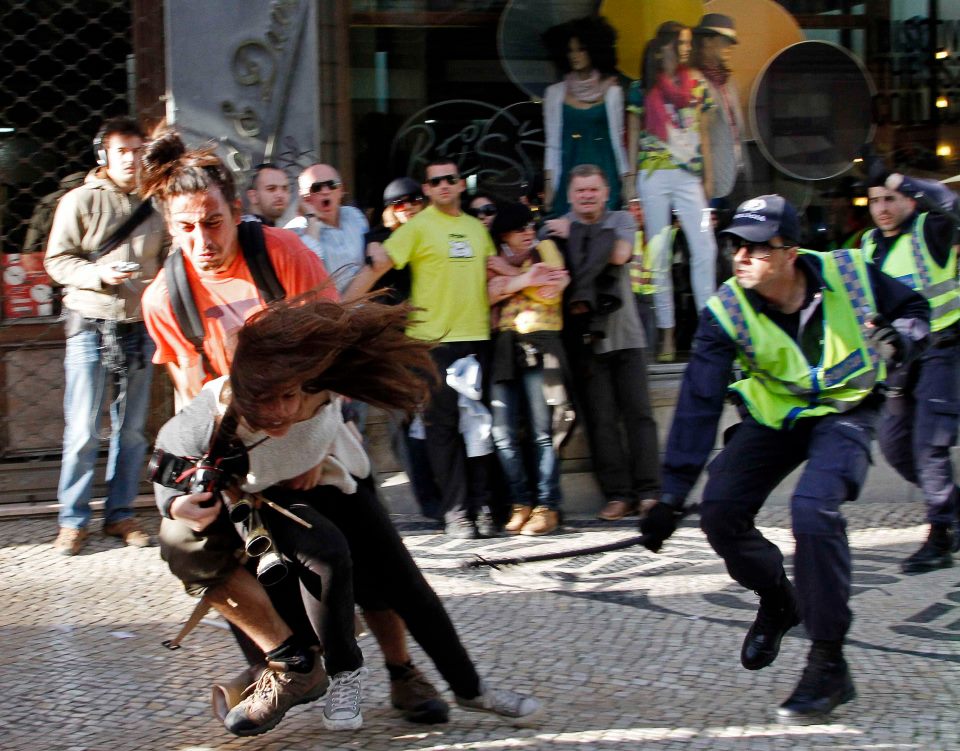
Portugal faces a general strike by workers angered by austerity measures imposed as a condition of a 78-billion euro bailout last year but doubts remain as to whether Thursday's stoppage will receive widespread support. [REUTERS/Hugo Correia]

Portuguese strikers halted trains, shut ports and paralysed most public transport on Thursday in protest at austerity measures that is nevertheless unlikely to temper the government's resolve in implementing the terms of an EU/IMF bailout.
There was little impact outside of the transport sector from the general strike that caused no major output disruptions at companies. The country's second-largest union UGT did not back the strike, unlike in previous work stoppages.
Armenio Carlos, the new Communist leader of CGTP, the country's largest union confederation, wants its 700,000 members to send a signal to the centre-right government that the country will no longer tolerate the erosion of workers' rights, lower salaries and record high unemployment.
"We have to keep staging strikes, struggling. These policies do not resolve anything, we are on the same path as Greece," said Pedro Ramos, 38, and a union coordinator who works for a state waste management company.
Ramos was one of a few hundred CGTP members who gathered on the Rossio Square in downtown Lisbon, preparing to march towards parliament. Many were singing old Communist songs from the days of the 1974 bloodless Carnation revolution that re-established democracy in Portugal.
Asked about the turn-up, he shrugged his shoulders, saying "it's so-so". Other groups were meeting in other points of Lisbon, but their numbers were far below those in last month's peaceful rally that brought together over 100,000 protesters.
The CGTP could not say how many workers had responded to the strike call, but said the railway system was crippled, including the international Lisbon-Madrid route. Lisbon's underground was shut. Many hospitals were only accepting emergencies. It also said rubbish collectors, ports and some schools had shut down across the country.
Many struggled into work, unconvinced by the call to strike and reluctant to lose money in support of it.
"They go on strike and hurt us," said Ana Maria Verissimo, 53, a cleaning lady, as she waited for one of the few buses still running in Lisbon. "This won't resolve anything. They'll have to find another way. If I go on strike, my pay cheque will be lower at the end of the month."
ONE OF SMALLER STRIKES ON MEMORY
There was little evidence of stoppages in the private sector, with Portugal's main exporter, Volkswagen's (VOWG_p.DE) AutoEuropa plant, turning out cars. The government hopes exports will help lead the country out its recession by next year.
Flag carrier airline TAP was flying, and Lisbon airport functioning as normal. Output at Portugal's both oil refineries run by Galp (GALP.LS) was unaffected, according to the company.
"If you compare this strike to the previous general strikes in Portugal's democracy, this one clearly is in the low end," said Antonio Costa Pinto, research professor at the Institute of Social Sciences.
He said the fact that the UGT was not onboard was one factor affecting participation, while the government's recent about-turn regarding pay cuts in public companies due to be privatised "must have dissuaded a certain part of the public sector".
Government spokesman Luis Marques Guedes told a briefing that "the strike does not solve the country's problems and it seems to us that the majority of Portuguese understand that".
The government said it would not provide any figures on participation until the strike is over.
SECOND BAILOUT?
The Portuguese have so far shown little inclination for the kind of frequent and violent protests seen in Greece. The 520,000-strong UGT union has signed up to labour market reforms required by the European Union and IMF in return for the bailout and did not take part in the strike.
The country, facing its worst recession since the 1970s, was forced to take a bailout in May last year after running up large debts. Many economists say it might need a second bailout as the recession deepens, putting its budget targets in doubt and jeopardising its planned return to the bond market in late 2013.
Portugal's core deficit tripled in the first two months of 2012, showing that the economic slump is denting tax revenues and stoking concerns over the fiscal targets.
Still, Standard & Poor's ratings agency said on Thursday a Portuguese debt restructuring is avoidable as its debt level is lower than Greece's and it has shown more capacity to reform.
Portugal is western Europe's poorest country and followed Greece and Ireland in seeking a bailout to handle their crippling debts. Spain and Italy are also now facing austerity measures, and Italy's largest trade union is planning a general strike over labour market reforms.
UGT, which is allied to the opposition Socialist Party, has urged opponents of austerity to show restraint, warning that Portugal could descend into the kind of chaos seen in Greece.
The strikers say the new labour laws, which make it easier to hire and fire staff and which cut compensation for workers, mark the biggest step backwards for workers since Portugal's return to democracy in 1974 after military rule.
Source: Reuters.com